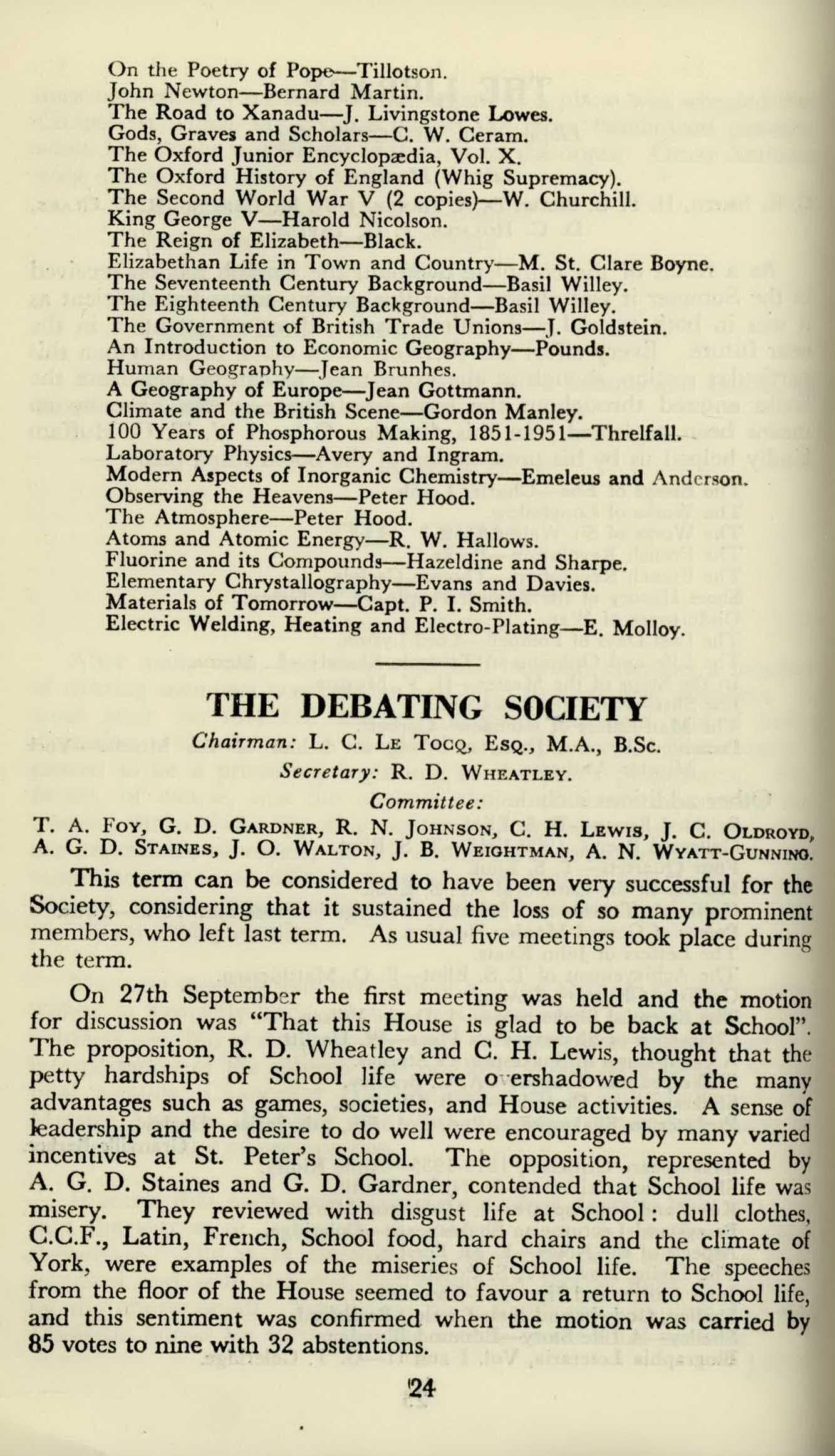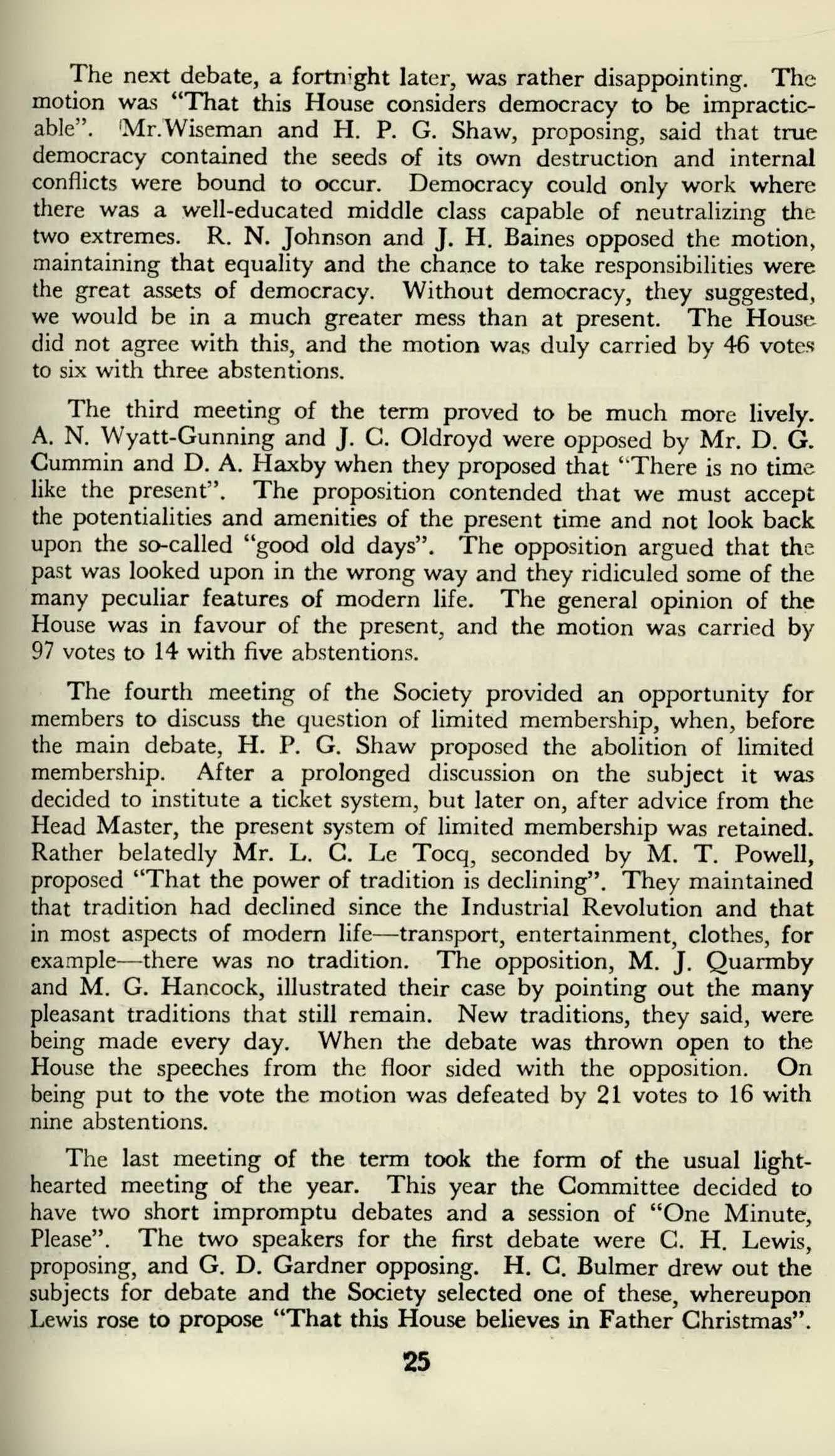
4 minute read
The Debating Society
from Jan 1953
by StPetersYork
On the Poetry of Pope—Tillotson. John Newton—Bernard Martin. The Road to Xanadu—J. Livingstone Lowes. Gods, Graves and Scholars—C. W. Ceram. The Oxford Junior Encyclopaedia, Vol. X. The Oxford History of England (Whig Supremacy). The Second World War V (2 copies)—W. Churchill. King George V—Harold Nicolson. The Reign of Elizabeth—Black. Elizabethan Life in Town and Country—M. St. Clare Boyne. The Seventeenth Century Background—Basil Willey. The Eighteenth Century Background—Basil Willey. The Government of British Trade Unions—j. Goldstein. An Introduction to Economic Geography—Pounds. Human Geography—Jean Brunhes. A Geography of Europe—Jean Gottmann. Climate and the British Scene—Gordon Manley. 100 Years of Phosphorous Making, 1851-1951—Threlfall. Laboratory Physics—Avery and Ingram. Modern Aspects of Inorganic Chemistry—Emeleus and Anderson. Observing the Heavens—Peter Hood. The Atmosphere—Peter Hood. Atoms and Atomic Energy—R. W. Hallows. Fluorine and its Compounds—Hazeldine and Sharpe. Elementary Chrystallography—Evans and Davies. Materials of Tomorrow—Capt. P. I. Smith. Electric Welding, Heating and Electro-Plating—E. Molloy.
Chairman: L. C. LE TOCQ, ESQ., M.A., B.Sc. Secretary: R. D. WHEATLEY. Committee:
T. A. FOY, G. D. GARDNER, R. N. JOHNSON, C. H. LEWIS, J. C. OLDROYD, A. G. D. STAINES, J. 0. WALTON, J. B. WEIOHTMAN, A. N. WYATT-GUNNINO.
This term can be considered to have been very successful for the Society, considering that it sustained the loss of so many prominent members, who left last term. As usual five meetings took place during the term.
On 27th September the first meeting was held and the motion for discussion was "That this House is glad to be back at School". The proposition, R. D. Wheatley and C. H. Lewis, thought that the petty hardships of School life were o ershadowed by the many advantages such as games, societies, and House activities. A sense of leadership and the desire to do well were encouraged by many varied incentives at St. Peter's School. The opposition, represented by A. G. D. Staines and G. D. Gardner, contended that School life was misery. They reviewed with disgust life at School : dull clothes, C.C.F., Latin, French, School food, hard chairs and the climate of York, were examples of the miseries of School life. The speeches from the floor of the House seemed to favour a return to School life, and this sentiment was confirmed when the motion was carried by 85 votes to nine with 32 abstentions. '24
The next debate, a fortnight later, was rather disappointing. The motion was "That this House considers democracy to be impracticable". 1 Mr.Wiseman and H. P. G. Shaw, proposing, said that true democracy contained the seeds of its own destruction and internal conflicts were bound to occur. Democracy could only work where there was a well-educated middle class capable of neutralizing the two extremes. R. N. Johnson and J. H. Baines opposed the motion, maintaining that equality and the chance to take responsibilities were the great assets of democracy. Without democracy, they suggested, we would be in a much greater mess than at present. The House did not agree with this, and the motion was duly carried by 46 votes to six with three abstentions.
The third meeting of the term proved to be much more lively. A. N. Wyatt-Gunning and J. C. Oldroyd were opposed by Mr. D. G. Cummin and D. A. Haxby when they proposed that "There is no time like the present". The proposition contended that we must accept the potentialities and amenities of the present time and not look back upon the so-called "good old days". The opposition argued that the past was looked upon in the wrong way and they ridiculed some of the many peculiar features of modern life. The general opinion of the House was in favour of the present, and the motion was carried by 97 votes to 14 with five abstentions.
The fourth meeting of the Society provided an opportunity for members to discuss the question of limited membership, when, before the main debate, H. P. G. Shaw proposed the abolition of limited membership. After a prolonged discussion on the subject it was decided to institute a ticket system, but later on, after advice from the Head Master, the present system of limited membership was retained. Rather belatedly Mr. L. C. Le Tocq, seconded by M. T. Powell, proposed "That the power of tradition is declining". They maintained that tradition had declined since the Industrial Revolution and that in most aspects of modem life—transport, entertainment, clothes, for example—there was no tradition. The opposition, M. J. Quarmby and M. G. Hancock, illustrated their case by pointing out the many pleasant traditions that still remain. New traditions, they said, were being made every day. When the debate was thrown open to the House the speeches from the floor sided with the opposition. On being put to the vote the motion was defeated by 21 votes to 16 with nine abstentions.
The last meeting of the term took the form of the usual lighthearted meeting of the year. This year the Committee decided to have two short impromptu debates and a session of "One Minute, Please". The two speakers for the first debate were C. H. Lewis, proposing, and G. D. Gardner opposing. H. C. Bulmer drew out the subjects for debate and the Society selected one of these, whereupon Lewis rose to propose "That this House believes in Father Christmas".
25











